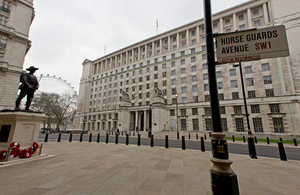Today in Parliament (Tuesday 29 March) Labour Markets minister Paul Scully announced a new statutory code on the practice of ‘fire and rehire’. The code will also clamp down on controversial tactics used by unscrupulous employers who fail to engage in meaningful consultations with employees.
The practice of ‘fire and rehire’ refers to when an employer dismisses a worker and rehires them on new, less-favourable terms. The government has always been clear that using fire and rehire as a negotiating tactic is completely unacceptable, and we expect companies to treat their employees fairly.
However, in light of the disgraceful actions of P&O Ferries in sacking 800 workers on the spot without consultation, the government recognises the need for greater clarity for employers. The new Statutory Code of Practice will detail how businesses must hold fair, transparent and meaningful consultations on proposed changes to employment terms.
This is what P&O Ferries failed to do – as its CEO made clear, the company never had any intention of consulting workers, and they are now rightly facing backlash from workers, the public and the government.
The code will include practical steps that employers should follow. A court or Employment Tribunal will take the code into account when considering relevant cases, including unfair dismissal. The courts will have the power to apply an uplift of up to 25% of an employee’s compensation if an employer unreasonably fails to comply with the Code where it applies.
Labour Markets Minister Paul Scully said:
P&O Ferries’ actions were not a case of fire and rehire – just fire.
However, the way the company acted in not consulting employees before taking extreme measures was appalling. This has laid bare the measures some deceitful employers are prepared to take to exploit and break the law.
That is why we are producing a new code to tighten the screw on unscrupulous employers, who must comply with a new statutory code on tougher employment rules – including fire and rehire.
We expect companies to treat their employees fairly – and whilst the vast majority comply with the law – today we are going further to stand up for workers against those that flagrantly disregard it.
Fire and rehire tactics are often used when employers want to change the terms and conditions of their workers. This can take place when a company is in financial distress and needs to cut costs to stay in business.
In November 2021, Acas – the Advisory, Conciliation and Arbitration Service – published guidance for employers considering making changes to employment contracts, making clear that fire and rehire should be an option of last resort and that employers should first have made all reasonable attempts to reach agreement through full consultation.
The government is now going further, by developing a new Statutory Code of Practice, which will clarify and give some legal force to government expectations that employers should behave fairly and reasonably when seeking to change employees’ terms and conditions.
The code will act as a deterrent, particularly to those employers seeking to use the threat of fire and rehire as a negotiation tactic.
The government has always stood firm against businesses seeking to use fire and rehire practices, which should only ever be considered as an absolute last resort if changes to employment contracts are critical and voluntary agreement is not possible.
Employers must recognise that this approach creates a high risk of legal claims, reputational damage and an adverse effect on employee relations.

